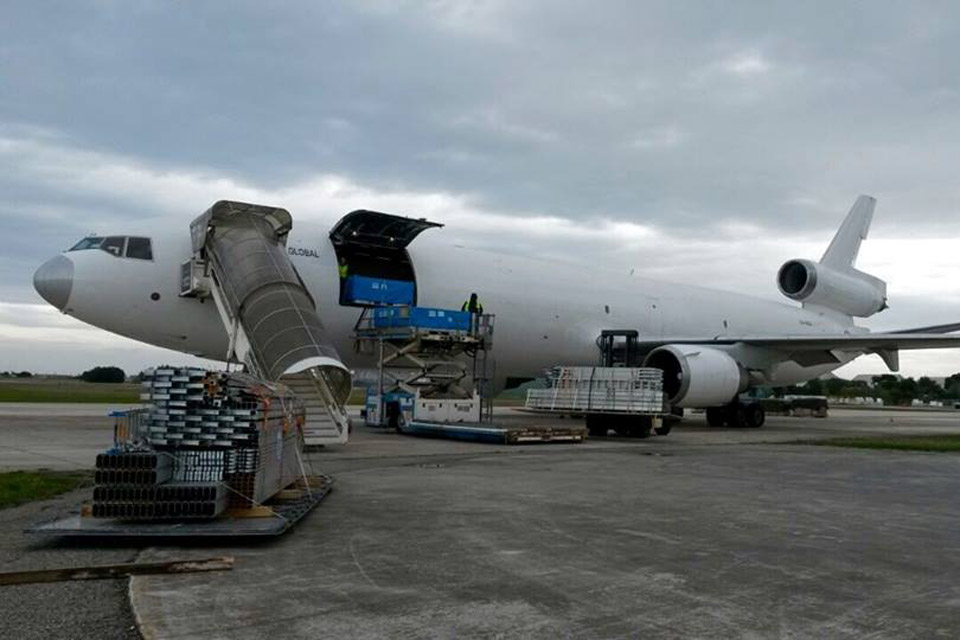
This plane at the UN Humanitarian Response Depot (UNHRD) in Italy is bound for Sierra Leone with $300,000 worth of World Food Programme (WFP) equipment to tackle the Ebola outbreak. Photo: WFP
“This partnership increases both agencies’ abilities to reach, monitor and respond to the needs of all people touched by Ebola,” which has affected some 24,000 people with nearly 10,000 deaths, WHO Director-General Margaret Chan said in the announcement.
“It helps us deploy and maintain technical teams with expertise in infection prevention and control, epidemiology, and contact tracing, enabling dedicated health workers in the deep field to do their best work,” according to Dr. Chan. “The partnership is also a learning opportunity for the future, informing our capacities to launch joint operations during large-scale emergencies.”
“Over the past seven months, partnerships have been crucial in fighting this devastating outbreak,” said WFP Executive Director Ertharin Cousin. “WFP has worked with our partners to respond to communities’ most basic needs – making sure food is reaching everywhere that the Ebola virus has hit.”
Ms. Cousin said her agency’s logistical support to WHO and the wider humanitarian community has enabled affected people to receive the urgent care and support they need.
“We are making progress, however we must remain vigilant,” Ms. Cousin said. “The Ebola crisis will not end until we identify, reach and successfully treat every last case. Recognizing this goal, the WHO-WFP partnership – a joint technical and operational force – will continue providing the support required to achieve zero cases.”
The two agencies agreed to combine their expertise in joint operations in more than 60 priority districts and prefectures on the ground in Guinea, Liberia and Sierra Leone, the three most Ebola-affected countries.
“In districts with ongoing Ebola transmission, WFP is ensuring that WHO disease detectives have the resources they need – computer equipment, phones and stable internet connectivity – to share information critical to tracking and stopping the virus,” according to the announcement.
WFP is also managing the fleet of rugged vehicles carrying WHO social anthropologists and epidemiologists to isolated villages, where they will continue gaining the trust of communities to find and follow contacts of Ebola patients until all cases are resolved.
WHO is the directing and coordinating authority for health within the UN system and WFP is the world’s largest humanitarian agency fighting hunger worldwide.
FRENCH VERSION
L’Organisation mondiale de la santé des Nations Unies (OMS) etle Programme alimentaire mondial (PAM) a annoncé aujourd’huiqu’ils combinent leur expertise en santé publique et la logistiquedans un nouveau partenariat pour apporter l’épidémie d’Ebola àzéro en Afrique de l’Ouest.
« Il nous aide à déployer et à gérer des équipes techniques ayantune expertise en prévention des infections et contrôle,épidémiologie ou communiquez avec suivi, permettant auxtravailleurs de la santé dévoués dans le champ profond de faireleurs meilleurs travaux, » selon le Dr. Chan. « le partenariat estaussi une occasion d’apprentissage pour l’avenir, pour informernos capacités à lancer des opérations conjointes en cas d’urgence à grande échelle”.
« Depuis sept mois, des partenariats ont été déterminants dans lalutte contre cette épidémie dévastatrice, » a déclaré le directeurexécutif du PAM Ertharin Cousin. « Le PAM a travaillé avec nospartenaires pour répondre aux besoins les plus élémentaires descommunautés – en s’assurant la nourriture atteint partout où levirus Ebola a frappé. »
Mme Cousin dit le soutien logistique de l’Agence à l’OMS et lacommunauté humanitaire a permis à des personnes touchéesrecevoir les soins urgents et le soutien dont ils ont besoin.
« Nous faisons des progrès, mais nous devons rester vigilants, » a déclaré Mme Cousin. “La crise de l’Ebola ne finira pas jusqu’à ce que nous identifions, atteindre et traiter avec succès les casmoindres. Reconnaissant cet objectif, le partenariat de WHO-PAM – forcer une articulation technique et opérationnelle –continuera offrant le soutien nécessaire pour atteindre zéro cas. »
Les deux organismes ont convenu de regrouper leur expertisedans des opérations conjointes dans plus de 60 districtsprioritaires et des préfectures sur le terrain en Guinée, Libéria etSierra Leone, les trois pays touchés plus Ebola.
« Dans les districts où la transmission Ebola, PAM s’assure quel’OMS maladie détectives ont les ressources que dont ils ontbesoin – matériel d’ordinateurs, de téléphones et de stable àInternet – à partager les renseignements jugés essentiels pour lesuivi et l’arrêt des virus, » selon l’annonce.
PAM gère également la flotte de véhicules accidentés quitransportant des anthropologues sociaux et épidémiologistesdans des villages isolés, où ils vont continuer à gagner laconfiance des collectivités de trouver et suivre les contacts despatients Ebola jusqu’à ce que tous les cas sont résolus.
QUI est l’autorité de direction et de coordination pour la santé au sein de l’ONU et le PAM est la plus grande agence humanitairedu monde de lutte contre la faim dans le monde entier.


